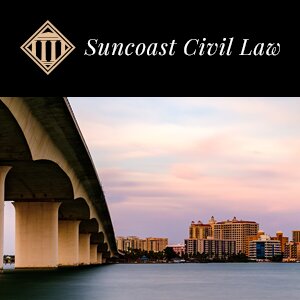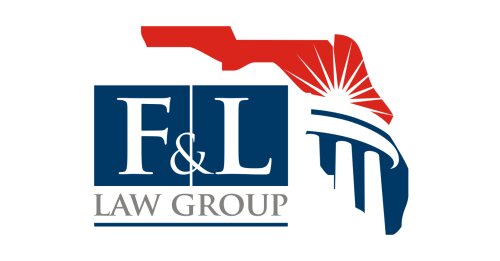Best Lawsuits & Disputes Lawyers in Florida
Share your needs with us, get contacted by law firms.
Free. Takes 2 min.
Or refine your search by selecting a city:
List of the best lawyers in Florida, United States
About Lawsuits & Disputes Law in Florida, United States
Lawsuits and disputes law in Florida covers a broad range of legal issues that arise when individuals, businesses, or organizations disagree over legal rights or obligations. These disputes can involve contracts, property rights, personal injuries, employment matters, landlord-tenant issues, and more. The Florida legal system offers various avenues for resolving disputes, including negotiation, mediation, arbitration, and formal litigation in court. Understanding the basics of lawsuits and dispute resolution is important for anyone facing or considering legal action in Florida.
Why You May Need a Lawyer
A lawyer can provide crucial assistance in many situations involving lawsuits and disputes. Some common reasons you may need a lawyer include:
- If you are being sued or need to file a lawsuit
- Negotiating or drafting contracts to avoid future disputes
- Resolving property or landlord-tenant disagreements
- Handling personal injury or accident claims
- Addressing family law disputes such as divorce, child custody, or support matters
- Facing employment-related conflicts or discrimination claims
- Responding to breach of contract allegations
- Assisting with debt collection or defending against collections
- Settling disputes through mediation or arbitration
- Ensuring compliance with relevant procedural rules and deadlines
An experienced attorney can advise you on your legal rights, help you understand your options, and represent your interests effectively in negotiations, mediation settings, or court.
Local Laws Overview
Florida law has several unique aspects that are relevant to lawsuits and disputes:
- Statute of Limitations: Florida law sets specific time limits for filing different types of lawsuits, such as four years for most personal injury claims and five years for written contracts.
- Comparative Fault: In personal injury cases, Florida follows a modified comparative fault rule, which may reduce your recovery if you are found partially at fault for an incident.
- Small Claims Court: Florida’s small claims courts handle cases involving claims of up to $8,000, making it easier for individuals to resolve minor disputes without extensive legal costs.
- Mediation Requirements: Many counties require parties to attend mediation before proceeding to a trial in civil cases, encouraging settlement and reducing court backlog.
- Jurisdiction & Venue: Laws determine in which court and location a lawsuit should be filed, depending on the nature of the dispute and the parties involved.
- Punitive Damages: Florida has placed caps and strict requirements on when punitive damages can be awarded in civil cases.
It is important to consult an attorney to ensure that you follow all applicable laws and procedures based on your specific circumstances in Florida.
Frequently Asked Questions
What is the process for filing a lawsuit in Florida?
The process generally involves preparing a complaint, filing it with the appropriate Florida court, serving the defendant with legal papers, engaging in discovery, attending mediation or settlement conferences, and potentially going to trial if the dispute is not resolved.
How long do I have to file a lawsuit after an incident in Florida?
This depends on the type of case. For most personal injury claims, you have four years from the date of the incident. For written contracts, you typically have five years. Certain cases, such as medical malpractice, have shorter time limits.
What happens if I miss the statute of limitations?
If you file after the statute of limitations has expired, your case will likely be dismissed, and you may lose your right to seek legal relief.
Can I represent myself in a Florida lawsuit?
You have the right to represent yourself, known as proceeding "pro se," but lawsuits can be complex. Having a knowledgeable attorney is often crucial for protecting your rights and achieving the best outcome.
What is the difference between mediation and arbitration?
Mediation is a voluntary process where a neutral third party helps parties reach a settlement. Arbitration is more formal; an arbitrator hears both sides and makes a binding decision. Courts in Florida often require mediation before trial.
What is small claims court and what is the limit in Florida?
Small claims court handles cases involving disputes up to $8,000, excluding costs and interest. These courts offer a faster and simpler process for resolving smaller legal disagreements.
What are the court fees for filing a lawsuit in Florida?
Court fees vary depending on the type and value of the claim, typically ranging from $55 for small claims to several hundred dollars for higher value lawsuits in civil court.
How long does a typical lawsuit take to resolve in Florida?
The time to resolution varies depending on the complexity of the case, cooperation of the parties, and the court's schedule. Simple cases may take a few months, while complex disputes can take several years.
Are there alternatives to going to court for resolving my dispute?
Yes, alternatives include negotiation, mediation, or arbitration. These methods can be faster, less costly, and less adversarial than traditional court proceedings.
Can court decisions be appealed in Florida?
Yes, most final judgments can be appealed within a set time frame if there is a legal basis for challenging the outcome. Appeals must follow specific procedures and are typically heard by an appellate court.
Additional Resources
Several resources and organizations can help you with lawsuits and disputes in Florida:
- Florida Bar Association - Offers lawyer referral services, legal information, and resources for the public.
- Florida Courts - Provides forms, instructions, and self-help resources for civil legal matters.
- Legal Aid Organizations - Local legal aid societies offer free or low-cost legal help for those who qualify based on income.
- County Clerk of Courts - Handles civil filings, provides records, and offers information on local court procedures.
- Florida Department of Business and Professional Regulation - Helps with certain consumer disputes and business issues.
- Mediation Centers - Many counties have mediation programs to help parties resolve disputes without litigation.
Next Steps
If you are facing a lawsuit or dispute in Florida or believe you may need to take legal action, consider taking these steps:
- Gather all relevant documents and information related to your dispute.
- Consider your goals and what you hope to achieve through the legal process.
- Contact a qualified attorney who regularly handles lawsuits and dispute resolution in Florida.
- Discuss your options for resolving the issue, including the possibility of settlement or alternative dispute resolution.
- Stay informed about deadlines, court appearance requirements, and procedural rules that may apply to your case.
- Use reputable resources, such as local bar associations or legal aid organizations, to find qualified assistance.
Acting early and seeking professional advice can make a significant difference in the outcome of your case and help you navigate the complex legal process with confidence.
Lawzana helps you find the best lawyers and law firms in Florida through a curated and pre-screened list of qualified legal professionals. Our platform offers rankings and detailed profiles of attorneys and law firms, allowing you to compare based on practice areas, including Lawsuits & Disputes, experience, and client feedback.
Each profile includes a description of the firm's areas of practice, client reviews, team members and partners, year of establishment, spoken languages, office locations, contact information, social media presence, and any published articles or resources. Most firms on our platform speak English and are experienced in both local and international legal matters.
Get a quote from top-rated law firms in Florida, United States — quickly, securely, and without unnecessary hassle.
Disclaimer:
The information provided on this page is for general informational purposes only and does not constitute legal advice. While we strive to ensure the accuracy and relevance of the content, legal information may change over time, and interpretations of the law can vary. You should always consult with a qualified legal professional for advice specific to your situation.
We disclaim all liability for actions taken or not taken based on the content of this page. If you believe any information is incorrect or outdated, please contact us, and we will review and update it where appropriate.
Browse lawsuits & disputes law firms by service in Florida, United States
Florida, United States Attorneys in related practice areas.
Browse lawsuits & disputes law firms by city in Florida
Refine your search by selecting a city.















